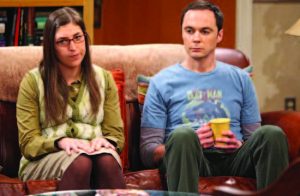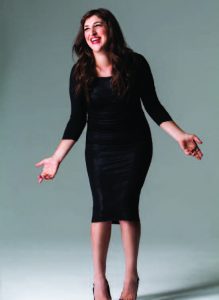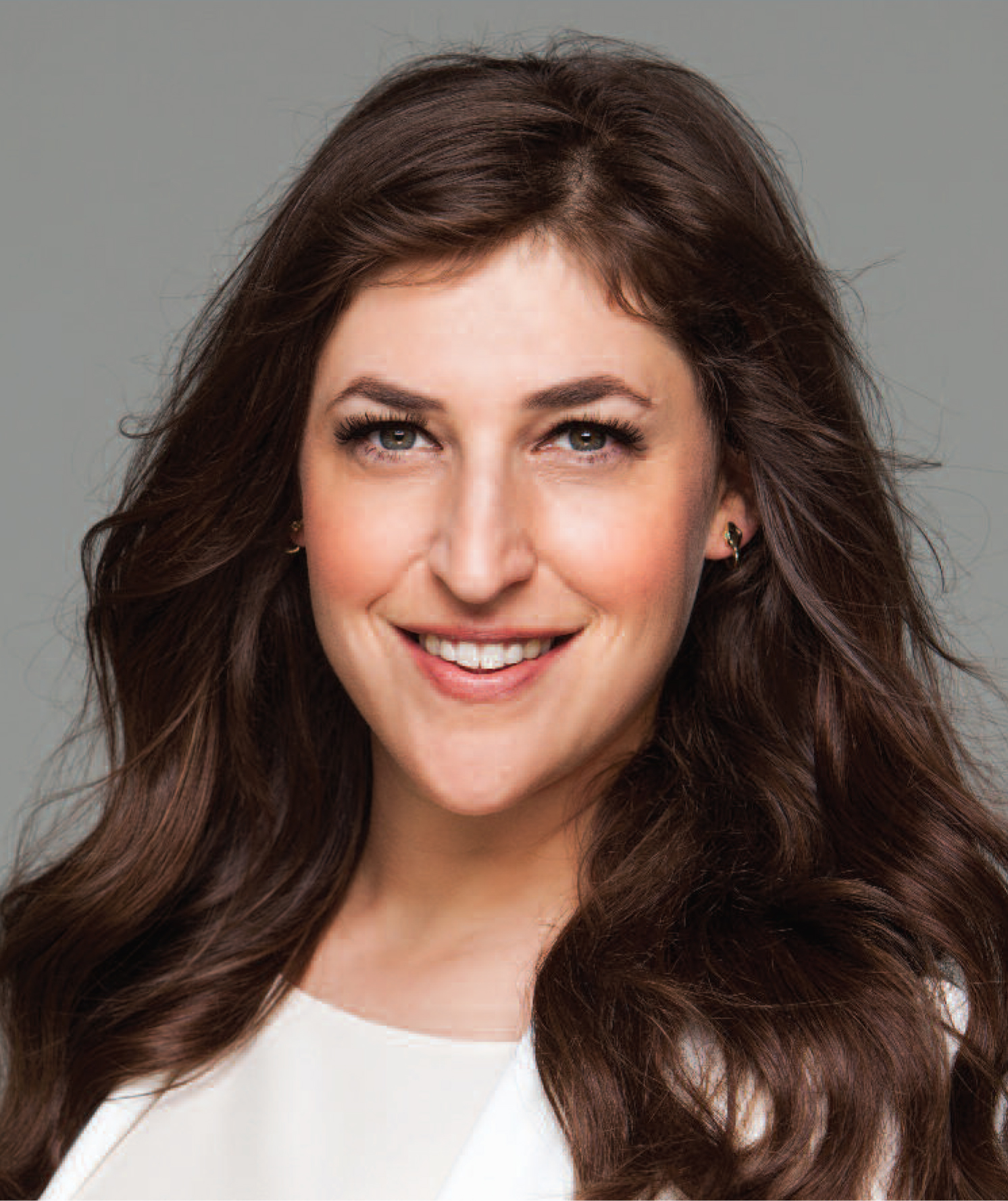One of the joys of acting is the chance to create a truly indelible character. Realistically speaking, few performers are afforded this opportunity during their careers; even fewer are able to actually pull it off. Mayim Bialik is two-for-two. As a teenager in the early 1990s, she played the title role on the hit NBC series Blossom. In the ensuing decade-and-a-half, she focused on her education (she has a PhD in Neuroscience from UCLA) and started a family—but kept her hand in the acting game. In 2010, Mayim played an unnamed character in the final episode of Season 3 of The Big Bang Theory. During hiatus, the show’s producers realized they had stumbled upon a “love interest” for quirky theoretical physicist Sheldon Cooper. In Season 4, Mayim’s character got a name (Amy Farrah Fowler) and a job (neuroscientist!), and brought new depth and dimension to an already sparkling ensemble cast. Gerry Strauss caught up with her over the summer as she wrapped up Season 9 of the series.
EDGE: Unlike many child actors, you had a relatively normal childhood.
MB: Yes, I had a normal elementary school kind of life. I was active in school plays. I felt comfortable in drama class when we had to do plays and stuff, but I was not a hammy kid. I wasn’t an exceptionally outgoing or theatrical kid. When I would meet other child actors they were very theatrical and always kind of “on.” That wasn’t me at all. Actually, I’m considered a late bloomer for a child actor because I started acting when I was almost in junior high school. Even though I was in Beaches when I was 12—and that came out when I was 13—I had just started acting about a year before that. Most child actors have been acting since they were toddlers. That’s a very different kind of personality. It’s a different kind of structure, as far as how you’re raised and the expectations of you.
EDGE: Did that help you avoid some of the pitfalls other young actors often experience?
MB: I do think part of it is that I wasn’t in the industry for my formative years. I had a different kind of perspective on it. As I said, when people start acting and they’re always given expectations and given positive reinforcement for being good—and negative reinforcement for not obeying direction—I think that sets up a complicated system. For me, my parents are first-generation American, so I come from a pretty strict immigrant mentality. My parents tried to still have me do chores and homework and all the things that kids do. I wasn’t emancipated—a lot of teenagers at 15 get to be considered legal adults if they’re in the acting world—my parents didn’t do that. Also, I wasn’t really a party person, so I wasn’t around drugs and alcohol. I think I was also really lucky that on the Blossom set I was 14 to 19 years old, and I never saw anyone drinking or doing drugs. They had a very clean set, and I think that’s really important.
EDGE: At what point did you start thinking about acting as a career path?

CBS/Warner Bros. Television
MB: I didn’t think of having a career. I knew that I liked acting in school plays, and I thought, “Oh, I should be an actress—kids do commercials and stuff like that.” I had no idea that I would have my own television show by the time I was 14. None of that was part of any grand plan at all. There are so many talented people in this industry, the chances of succeeding are so rare. I didn’t see any of that. It really just happened very quickly. Once I got Beaches, I felt like everything kind of free-fell, and all of a sudden I went from just being this kid who liked acting to a person with her own TV show.
EDGE: In that year before Beaches, you made your screen debut in the horror movie Pumpkinhead.
MB: Yeah, I had five lines. When you start acting, you try out for any audition. It was a very small part, because you don’t get big parts when you first start. I didn’t have the typical path to success that most child actors do in commercials and things because, in 1986, when I started, there was a notion that people on television needed to look what they called “All-American.” I didn’t look All-American. I’ve always had prominent features and I’ve always looked ethnic, so I ended up doing a lot of character roles on shows like Webster and Facts of Life. That’s why there are things like Pumpkinhead on my résumé, because as a young character actress you do quirky things instead of generic commercials.
EDGE: In Beaches you played Bette Midler as a girl. Did you realize what a big deal that was?
MB: Not really. My parents had always said I look like Bette Midler and Barbara Streisand, so I knew who Bette was. I didn’t really think I looked like her. I thought I looked like myself with a red wig (laughs). I had seen some of her movies, but I didn’t really grasp the full notion that I’d be on a big screen, or that people would be considering the film for awards and things like that. I think I’ve only maybe seen it all the way through once, at the premiere (laughs). It’s just not my kind of movie.
EDGE: Did you have to deal with the celebrity crush young TV stars do today?
MB: It felt very intense because I was a teenager and those are the hardest years of your life—so to live them publicly is very hard. But no, it wasn’t fame like people think of fame now. Our show was not a Top 10 show. Our show was not even a Top 20 show. We didn’t get that much attention, not like people do now. We also did that show at a time when there was no Internet, so the notion of celebrity as something fascinating, that just literally didn’t exist. Of course, we got recognized everywhere we went. If you go places where young people are, they’re going to recognize you. But no, it wasn’t the same as being on The Big Bang Theory. There was no notion of anyone caring what our personal lives were like. It just wasn’t like that then.
EDGE: After the series, you moved on—to school, to marriage, to motherhood and other endeavors away from the limelight. Did you lose your passion for acting?
MB: I made a conscious decision to leave acting because I wanted to pursue a degree in neuroscience. I had other interests, as everyone tends to, and I think women in particular should be encouraged to try lots of different things—especially with the under-representation of women in science. It just felt like an amazing opportunity. I took 12 years off, and I also had two children, so that became my main job in life. I’m very happy to return to acting and to be acting again, but my heart is still as a mom. That’s how I think of myself primarily, as a mom with two kids. They’re now seven and nine and a half, and I still do a lot of work in advocacy for STEM [Science Technology Engineering & Math] and things like that. I wasn’t planning on being a regular on a TV show again. But I’m very grateful that I’m employed now as an actor.
EDGE: The character that brought you back in the public eye was Amy Farrah Fowler, who would become a very unique counterpart to Sheldon on The Big Bang Theory. How did you get that role?
MB: I was called to audition for this part along with hundreds of other actresses in Hollywood who were trying to get work. I didn’t get any special offers. I went and auditioned with a bunch of other women. The initial part was in the finale of Season 3 and it was maybe six lines. The character didn’t have a name, she didn’t have a career or a job—we didn’t really know anything about her—so I was just brought on to do these few lines. They didn’t even know if this character would continue.
EDGE: In Season 4, Amy starts as a female version of Sheldon. Over time, we’ve learned that she has a very emotional, even somewhat bawdy side to her. Have you had any reservations about some of the outrageous things that have come out of Amy’s mouth?
MB: Not really. As an actor, you have to sort of do whatever’s on the page. There are things I’m not great at as an actor, and those are things that our director, Mark Cendrowski, gets to work out with us. Acting drunk was not easy for me, but we made it through that. A lot of the things that Jim [Parsons] and I have where Amy and Sheldon are more intimate, I don’t want to say that those are difficult or out of my comfort zone, but those are new things for us as actors together. There are always new things to learn, and I guess that’s the fun thing about having a great job like this one. Our writers are constantly challenging us, and I’m fortunate to be working with amazing actors who are ready to take on that challenge.
EDGE: Do you have any input in the fleshing-out of the Amy–Sheldon relationship?

Photo by James Banasiak for EDGE Magazine
MB: None. As actors, our job is to take a script and make it right, make it funny in how it performs. Every single thing that you see that you love is an expression of our writers. There’s a little bit of all of our characters in each of our writers, and that’s what you’re seeing. They’re really, really talented people, and they seem to me a lot more like a group of intellectuals or academics rather than a group of comedy writers. They’re just a really smart, interesting group of people and they’ve produced all of these characters.
EDGE: Big Bang has impacted popular culture in some interesting ways. It has shown science and scientists in a very positive and relatable light. It has also validated “nerd culture” for lack of a better term. What else do you feel the show has accomplished?
MB: Well, I think our show demonstrates that there’s someone for everyone. We have these characters who—a lot of people would acknowledge—are the kind of people that get teased and left out of things. We are showing a group of characters that all have jobs and they have romantic relationships and they have social lives, and no one’s trying to medicate them or change them. Of course, they’re not always happy with the way the others act, but it’s not a show about changing people who are different. It’s about living with people who are different. And I think that’s really special. I also think the Amy and Sheldon relationship might be the longest running non-sexual intimate relationship we’ve seen on television. I think that’s really sweet. It shows a lot of patience and it shows a lot of love. Obviously, last season’s finale shows that Amy’s a little bit fed up and needing to take some time to think. But for the most part, it’s a very interesting relationship we’ve shown.
EDGE: Your audience knows you so well from sitcoms, which makes me wonder: Do you think of yourself as a comedic performer who acts, or as an actor who happens to do comedy?
MB: Gosh, that’s a hard question. I guess I would prefer the more general term “actor.” But obviously, I’m known for being a comedian. But when I think of “comedian,” I think of people like [Big Bang co-star] Melissa Rauch, who’s an amazing comedian. She’s a stand-up, and when she goes on a talk show she can tell stories and anecdotes and things like that. I don’t think of myself as a comedian like that, but I guess I’m an actor known for comedy. How’s that?
EDGE: A lot of doors are open to you now. What type of work would you like to do going forward?
MB: There are a lot of things I haven’t done. I haven’t really done movies as an adult. I haven’t really done drama as an adult. As I said, I also do a lot of advocacy for science and women in science, so that’s something I might explore. So yeah, there’s a lot left to do.
Editor’s Note: Gerry Strauss has interviewed a number of television stars for EDGE in the past two years, including Lisa Kudrow and New Jerseyans Wendy Williams, Laura Prepon and Jason Biggs.





